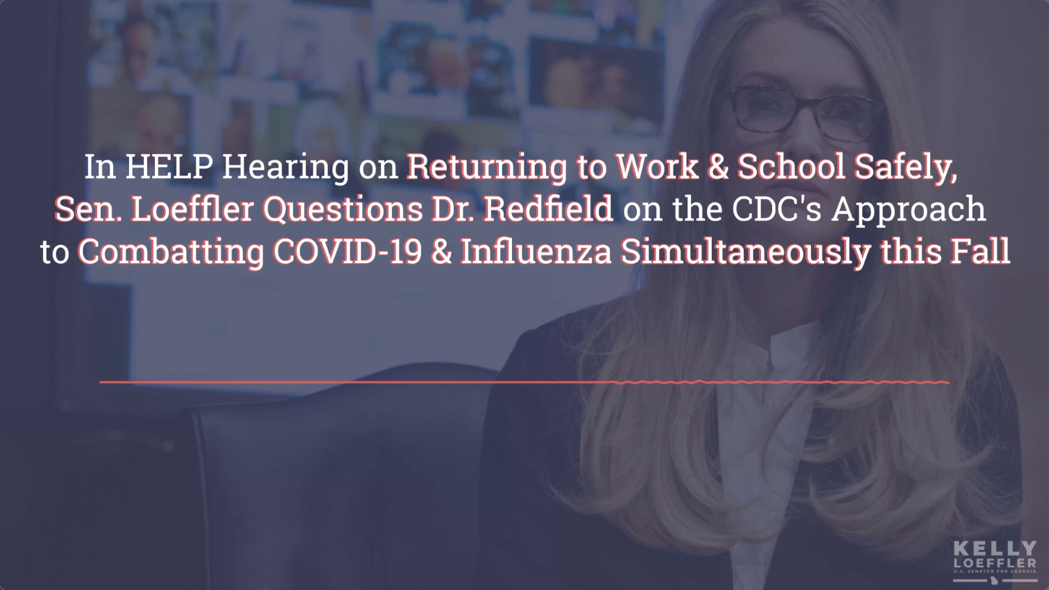
Also Inquires About Boosting Domestic Production of Pharmaceuticals, Medical Supplies
At a U.S. Senate Health, Education, Labor and Pensions Committee hearing, U.S. Senator Kelly Loeffler (R-Ga.) asked administration officials about how they plan to handle COVID-19 this fall and what steps the administration could take to increase domestic production of pharmaceuticals and medical supplies.
Loeffler asked Centers for Disease Control and Prevention (CDC) Director Dr. Robert Redfield about how the CDC is preparing for flu season amid the COVID-19 pandemic. Loeffler also asked Food and Drug Administration (FDA) Commissioner Stephen Hahn about how the United States can boost domestic production of pharmaceuticals and medical supplies. Loeffler introduced the Bring Entrepreneurial Advancements to Consumers Here In North America (BEAT CHINA) Act to incentivize pharmaceutical and medical device and supply manufacturers to relocate to the United States.
SENATOR LOEFFLER: “I wanted to ask, Dr. Redfield, can you outline what steps the CDC is taking to look at, as we prepare for handling both the flu and COVID-19 season simultaneously this fall. I know the CDC recently developed a test that diagnoses both COVID-19 and the flu, but what other activities is the agency engaged in and are there any novel approaches you see in terms of implementing this? I would love to hear about the agency’s process for approaching the season this fall and your thoughts there.”
ROBERT REDFIELD:“Thank you very much, Senator. I think it is really important to recognize that it is going to be difficult with flu and COVID-19 this fall. First and foremost is to try to increase the American public’s acceptance of [the] flu vaccine. As you know, less than 50% accept it. We’re working hard to begin to reach out, particularly to groups that have been underrepresented, to try to build that confidence in vaccination. We’ve worked with the manufacturers to see if they could boost the amount of vaccine that would be available. They’ve now increased their commitment to almost 189 million doses. CDC bought another 7.1 million doses. Normally we buy about 500,000 to able to be available to the states and local health departments for uninsured adults. We’ve increased that to 7.1 million doses. We’ve augmented our commitment to the children vaccine program, anticipating there is more children that will qualify in light of the unemployment. So those are some of the areas that we’ve begun to prepare for.”
LOEFFLER: “Thank you. And this question is for Dr. Hahn. The pandemic has exposed our vulnerabilities in the medical supply chain and obviously we have a reliance on imports from countries like China that could quickly pose a national security risk in the face of an outbreak of infectious disease. We need to come up with a strategy to boost our production here, both pharmaceuticals and supplies. I’ve introduced some legislation titled the BEAT CHINA Act, to offer incentives for companies that bring manufacturing back to the United States. But would like to hear from you what additional steps could policymakers take to boost our capability to produce these supplies and pharmaceuticals domestically.”
STEVEN HAHN:“Thank you Senator Loeffler and your leadership on this. I think one issue we could agree on is the lack of redundancy in the supply chain and the dependency that we’ve seen during the COVID-19 pandemic has been a problem. The agency’s primary focus has been on instilling redundancy in the supply chain, particularly of pharmaceuticals by diversifying that supply chain. And really looking for opportunities to encourage domestic manufacturing. We, of course, on the regulatory side, provide guidance as well as regulations around the manufacturing specifications to ensure quality of pharmaceuticals and other medical products. We will continue to do that particularly in the advanced manufacturing space in order to encourage domestic manufacturing. We look forward very much to working with you and other members of congress to see how we could create the proper incentives to have that redundancy and particularly to have as much domestic manufacturing as possible.”


Bulloch Public Safety
06/09/2025 Booking Report for Bulloch County

Bulloch Lifestyle
Adoptable Pet of the Week: Senor Tucan

Georgia Lifestyle
Hey Georgians, Let’s Get Gatorwise

Chattooga Schools
GNTC announces Free Application Week for the fall semester

Bulloch Public Safety
05/27/2025 Booking Report for Bulloch County

Bulloch Public Safety
06/02/2025 Booking Report for Bulloch County

Bulloch Public Safety
05/19/2025 Booking Report for Bulloch County

Bulloch Public Safety
05/12/2025 Booking Report for Bulloch County

Bulloch Public Safety
05/16/2025 Booking Report for Bulloch County






